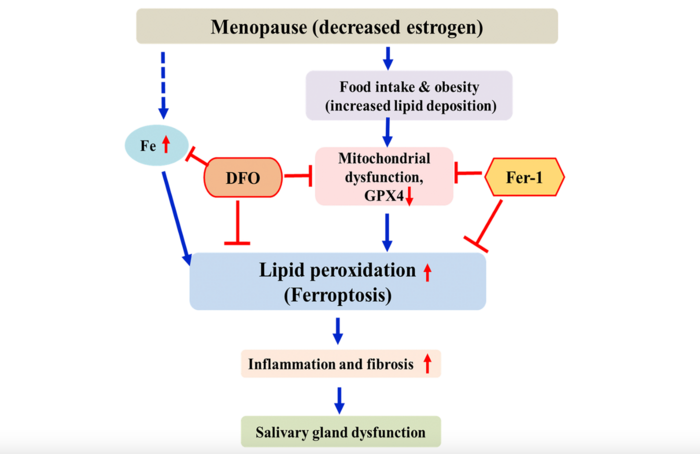“[…] this study is expected to be helpful in […] developing a treatment for postmenopausal dry mouth.”

Credit: 2023 Cheon et al.
“[…] this study is expected to be helpful in […] developing a treatment for postmenopausal dry mouth.”
BUFFALO, NY- April 26, 2023 – A new research paper was published in Aging (listed by MEDLINE/PubMed as “Aging (Albany NY)” and “Aging-US” by Web of Science) Volume 15, Issue 7, entitled, “Effect of deferoxamine and ferrostatin-1 on salivary gland dysfunction in ovariectomized rats.”
Xerostomia can be defined as a subjective sensation associated with reduction of lubrication and dehydration of the oral mucosa. Xerostomia is known to be common in elderly people, especially women, and its prevalence is thought to range from 5.5% to 46%. The mechanism underlying xerostomia after menopause has not yet been fully elucidated.
In this new study, researchers Yong-Il Cheon, Ji Min Kim, Sung-Chan Shin, Hyung-Sik Kim, Jin-Choon Lee, Gi Cheol Park, Eui-Suk Sung, Minhyung Lee, and Byung-Joo Lee from Pusan National University and Sungkyunkwan University School of Medicine aimed to investigate the mechanism of xerostomia and the effect of the ferroptosis inhibitors deferoxamine (DFO) and ferrostatin-1 (FER) on salivary gland dysfunction in a postmenopausal animal model.
“Recently, it was reported that ferroptosis in the salivary gland may be related to the xerostomia that occurs after menopause [30]. However, no studies to date have used anti-ferroptosis drugs to investigate the mechanisms underlying postmenopausal salivary gland dysfunction.”
Twenty-four female Sprague–Dawley rats were randomly divided into four groups: a SHAM group (n = 6, sham-operated rats), an OVX group (n = 6, ovariectomized rats), an FER group (n = 6, ovariectomized rats injected intraperitoneally with FER), and a DFO group (n = 6, ovariectomized rats injected intraperitoneally with DFO). GPX4 activity, iron accumulation, lipid peroxidation, inflammation, fibrosis, and salivary gland function were analyzed.
Recovery of GPX4 activity and a decrease in iron accumulation and cytosolic MDA + HAE were observed in the DFO group. In addition, collagen I, collagen III, TGF-β, IL-6, TNF-α, and TGF-β levels were decreased in the DFO group compared to the OVX group. Recovery of GPX4 activity and the morphology of mitochondria, and reduction of cytosolic MDA + HAE were also observed in the FER group. In addition, decreased expression of inflammatory cytokines and fibrosis markers and increased expression of AQP5 were observed in both the DFO and FER groups.
Postmenopausal salivary gland dysfunction is associated with ferroptosis. This is the first study to investigate the effect of ferroptosis inhibitors (DFO and FER) on the salivary glands of ovariectomized rats. DFO and FER are considered promising treatments for postmenopausal xerostomia.
“In the absence of a standard treatment for postmenopausal dry mouth, this study is expected to be helpful in understanding the mechanism of postmenopausal salivary gland dysfunction and developing a treatment for postmenopausal dry mouth.”
Read the full study: DOI: https://doi.org/10.18632/aging.204641
Corresponding Author: Byung-Joo Lee
Corresponding Email: [email protected]
Keywords: menopause, ferroptosis, xerostomia, deferoxamine, ferrostatin-1
Sign up for free Altmetric alerts about this article: https://aging.altmetric.com/details/email_updates?id=10.18632%2Faging.204641
About Aging-US:
Launched in 2009, Aging publishes papers of general interest and biological significance in all fields of aging research and age-related diseases, including cancer—and now, with a special focus on COVID-19 vulnerability as an age-dependent syndrome. Topics in Aging go beyond traditional gerontology, including, but not limited to, cellular and molecular biology, human age-related diseases, pathology in model organisms, signal transduction pathways (e.g., p53, sirtuins, and PI-3K/AKT/mTOR, among others), and approaches to modulating these signaling pathways.
Please visit our website at www.Aging-US.com and connect with us:
- SoundCloud
- YouTube
- LabTube
Click here to subscribe to Aging publication updates.
For media inquiries, please contact [email protected].
Aging (Aging-US) Journal Office
6666 E. Quaker Str., Suite 1B
Orchard Park, NY 14127
Phone: 1-800-922-0957, option 1
###
Journal
Aging-US
DOI
10.18632/aging.204641
Method of Research
Experimental study
Subject of Research
Animals
Article Title
Effect of deferoxamine and ferrostatin-1 on salivary gland dysfunction in ovariectomized rats
Article Publication Date
6-Apr-2023




